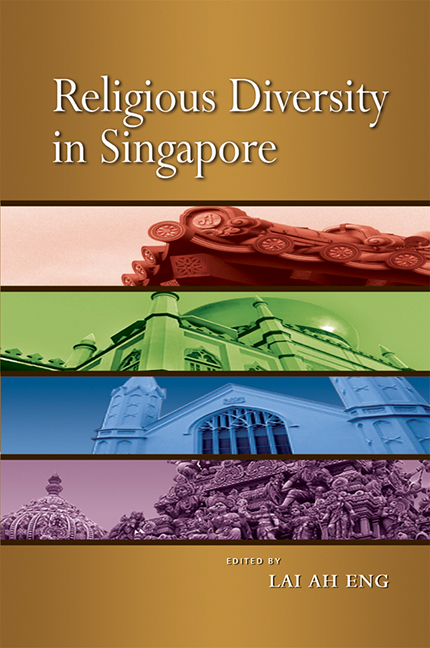Book contents
- Frontmatter
- Contents
- List of Figures and Tables
- List of Appendices
- FOREWORD
- PREFACE
- Acknowledgements
- The Contributors
- Abbreviations
- Glossary
- INTRODUCTION
- PART I The Landscape of Religious Diversity
- PART II Religion in Schools and Among the Young
- 13 From Moral Values to Citizenship Education: The Teaching of Religion in Singapore Schools
- 14 Religious Education as Locus of Curriculum: A Brief Inquiry into Madrasah Curriculum in Singapore
- 15 Mission Schools in Singapore: Religious Harmony, Social Identities, and the Negotiation of Evangelical Cultures
- 16 Religious Switching and Knowledge among Adolescents in Singapore
- PART III Religion in the Media
- PART IV Religious Organizations in Social Services
- PART V Interfaith Issues and Interaction
- Index
14 - Religious Education as Locus of Curriculum: A Brief Inquiry into Madrasah Curriculum in Singapore
from PART II - Religion in Schools and Among the Young
Published online by Cambridge University Press: 21 October 2015
- Frontmatter
- Contents
- List of Figures and Tables
- List of Appendices
- FOREWORD
- PREFACE
- Acknowledgements
- The Contributors
- Abbreviations
- Glossary
- INTRODUCTION
- PART I The Landscape of Religious Diversity
- PART II Religion in Schools and Among the Young
- 13 From Moral Values to Citizenship Education: The Teaching of Religion in Singapore Schools
- 14 Religious Education as Locus of Curriculum: A Brief Inquiry into Madrasah Curriculum in Singapore
- 15 Mission Schools in Singapore: Religious Harmony, Social Identities, and the Negotiation of Evangelical Cultures
- 16 Religious Switching and Knowledge among Adolescents in Singapore
- PART III Religion in the Media
- PART IV Religious Organizations in Social Services
- PART V Interfaith Issues and Interaction
- Index
Summary
INTRODUCTION
In the context of Singapore, the madrasah has been understood as a religious school or religious educational institution, be it at the preparatory (kindergarten) stage, primary, secondary or post-secondary levels. The madrasah has therefore been expected to offer a curriculum which focuses on religious subjects to stay true to its sanctity as a religious institution. Such curricular content for the madrasah has been construed by many Muslims to be sound and logical to producing Muslim religious elites and its key educational objective. However, the issue of curriculum content of madrasahs in Singapore has been receiving public and national leaders’ attention since the 1980s as a result of their less than satisfactory academic performance compared to that of national schools in the annual national examinations.
There has been a growing concern over the madrasah's peripheral position in the overall scheme of national development and economic progress. Scores of public forums and discourses took place within and amongst the madrasah fraternity, religious elites, interested individuals and organizations on the future and survival of madrasahs, particularly soon after the political leaders’ announcement of the introduction of compulsory education for the six madrasahs. Out of such flurry of opinionated exchanges and public engagements are demands for more reforms along the line of national schools’ curriculum, much to the traditionalists’ discontent. The traditional camp argues that such reforms could blur the very basis of madrasah's existence as the repository of religious education and erode its religious character. The articulations between contending parties, including those who are neutral but whose interest lies in the continued existence of madrasahs in whatever form, posit varied concerns. These range from the quality of teaching and learning in madrasahs, infrastructures and support structure or the lack of it and archaic pedagogy, to alleged socio-political engineering that could lead to the madrasahs’ exit from the Singapore educational landscape. Putting all the pieces of arguments and articulations together as one whole, one realizes that the curriculum of the madrasah becomes the focal point of interest. While much effort is on the way to reformulate the madrasah curriculum in the context of the ever-changing and borderless world, there is a need to understand the underlying philosophical and socio-religious make-up of the early curriculum planners and the social context of their planning.
- Type
- Chapter
- Information
- Religious Diversity in Singapore , pp. 342 - 361Publisher: ISEAS–Yusof Ishak InstitutePrint publication year: 2008



